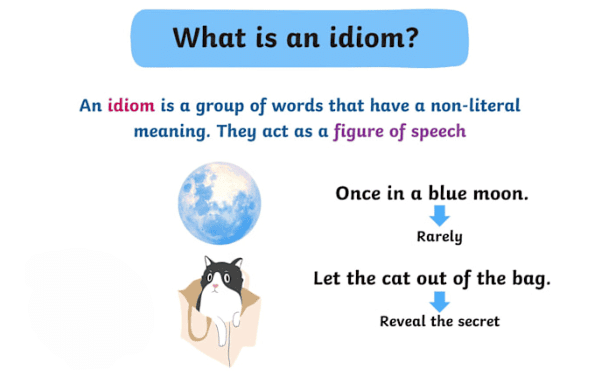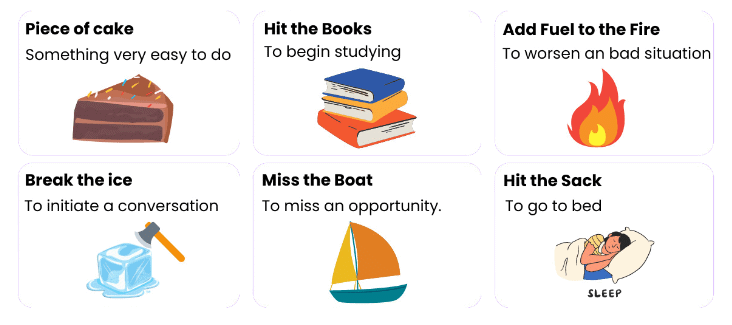Idioms | English Olympiad for Class 6 PDF Download
| Table of contents |

|
| What Is an Idiom? |

|
| Why Use Idioms? |

|
| List of Commonly Used Idioms |

|
| Some More Commonly Used Idioms |

|
What Is an Idiom?
- An idiom is a phrase or group of words that has a special meaning, different from the usual meaning of the words in it.
- For example, if someone says, "It’s raining cats and dogs," it doesn’t mean animals are falling from the sky; it just means that it’s raining very heavily.
- According to different dictionaries, an idiom is a phrase where the meaning changes when the words are put together. You can’t figure out the meaning by looking at each word separately.
- For example, the phrase "up in the air" doesn’t mean something is flying; it means something is undecided or not settled yet.

Why Use Idioms?
- Idioms make language more fun and creative, especially when used in informal writing or speech.
- They can add humour or express an idea in a unique way.
- However, idioms shouldn’t be used in formal writing, like school essays or professional work, because they might confuse people who don't know the idiom's meaning.
- So, when using idioms, make sure your audience will understand them. If they don't know what the idiom means, your sentence might not make sense to them.
List of Commonly Used Idioms
Idiom: Under the weather
Meaning: Feeling ill / Getting a cold
Sentence Example: My mom was feeling a bit under the weather.Idiom: Break the ice
Meaning: To initiate conversation in a social setting
Sentence Example: At the start of the meeting, Jane told a joke to break the ice.Idiom: A piece of cake
Meaning: Something very easy to do
Sentence Example: The math problem was a piece of cake for her.Idiom: Hit the nail on the head
Meaning: To be exactly right about something
Sentence Example: When you said that the team lacked coordination, you hit the nail on the head.Idiom: Let the cat out of the bag
Meaning: To reveal a secret accidentally or prematurely
Sentence Example: She let the cat out of the bag when she mentioned the surprise party.Idiom: Burn the midnight oil
Meaning: To work late into the night
Sentence Example: I had to burn the midnight oil to finish my project on time.Idiom: Bite the bullet
Meaning: To endure a painful or unpleasant situation bravely
Sentence Example: I hate going to the dentist, but I'll just have to bite the bullet.Idiom: Spill the beans
Meaning: To disclose a secret
Sentence Example: John accidentally spilled the beans about the company's new product launch.Idiom: A blessing in disguise
Meaning: Something that seems bad at first but turns out to be good
Sentence Example: Losing that job was a blessing in disguise—it pushed me to start my own business.Idiom: Once in a blue moon
Meaning: Something that happens very rarely
Sentence Example: My brother visits me once in a blue moon.Idiom: When pigs fly
Meaning: Something that will never happen
Sentence Example: I'll tidy my room when pigs fly.Idiom: Hit the books
Meaning: To study hard
Sentence Example: I have an exam tomorrow, so I need to hit the books tonight.Idiom: Let sleeping dogs lie
Meaning: Avoid bringing up old conflicts
Sentence Example: I think we should let sleeping dogs lie and not bring up the argument again.Idiom: Break a leg
Meaning: Good luck (especially used in theatre)
Sentence Example: Before going on stage, everyone told the actor to break a leg.Idiom: Kill two birds with one stone
Meaning: To accomplish two things with a single action
Sentence Example: I killed two birds with one stone by going to the bank and picking up groceries on my way home.Idiom: The ball is in your court
Meaning: It’s up to you to take action
Sentence Example: I’ve given you all the information you need—the ball is in your court now.Idiom: Cost an arm and a leg
Meaning: Something very expensive
Sentence Example: That designer handbag costs an arm and a leg.Idiom: Pull someone’s leg
Meaning: To joke or tease someone
Sentence Example: Don’t worry, I’m just pulling your leg.Idiom: Jump on the bandwagon
Meaning: To join others in doing something that is currently popular
Sentence Example: Everyone’s talking about the new app, so I decided to jump on the bandwagon and download it.Idiom: Barking up the wrong tree
Meaning: To make a wrong assumption
Sentence Example: If you think I’m the one who broke the vase, you’re barking up the wrong tree.

Some More Commonly Used Idioms
Cry over spilt milk
Meaning: To waste time worrying about something that’s already happened
Sentence Example: There’s no use crying over spilt milk—what’s done is done.Add fuel to the fire
Meaning: To make a situation worse
Sentence Example: His rude comments only added fuel to the fire.All ears
Meaning: Eager to listen
Sentence Example: I’m all ears; tell me what happened.Actions speak louder than words
Meaning: What you do is more important than what you say
Sentence Example: He keeps promising to help, but actions speak louder than words.Raining cats and dogs
Meaning: Raining very heavily
Sentence Example: It’s raining cats and dogs outside, so let’s stay indoors.Go the extra mile
Meaning: To make an extra effort
Sentence Example: She always goes the extra mile to help her friends.Beat around the bush
Meaning: To avoid talking about the main issue
Sentence Example: Stop beating around the bush and tell me what really happened.On cloud nine
Meaning: Extremely happy
Sentence Example: He was on cloud nine after winning the competition.In the same boat
Meaning: To be in the same difficult situation as someone else
Sentence Example: We’re all in the same boat, trying to meet this deadline.The best of both worlds
Meaning: A situation where you can enjoy the benefits of two different things
Sentence Example: Working from home gives me the best of both worlds—flexibility and comfort.Once in a lifetime
Meaning: Very rare or only happening once
Sentence Example: This is a once-in-a-lifetime opportunity, so don’t miss it.Like a fish out of water
Meaning: To feel uncomfortable in an unfamiliar situation
Sentence Example: He looked like a fish out of water during his first day at the new school.Burn bridges
Meaning: To ruin a relationship permanently
Sentence Example: Be careful not to burn bridges when you leave your job.Hitting the sack
Meaning: Going to bed
Sentence Example: I’m exhausted; I’m hitting the sack now.Curiosity killed the cat
Meaning: Being too curious can lead to trouble
Sentence Example: I wouldn’t ask too many questions—curiosity killed the cat, you know.Cut corners
Meaning: To do something in a way that is easy but not thorough or honest
Sentence Example: The contractor cut corners on the building project, which led to several issues later.Let bygones be bygones
Meaning: To forget past offenses or conflicts
Sentence Example: After years of arguing, they decided to let bygones be bygones.
|
25 videos|38 docs|66 tests
|
FAQs on Idioms - English Olympiad for Class 6
| 1. What are idioms and why are they important in language? |  |
| 2. Can you give examples of common idioms used in daily conversations? |  |
| 3. How can I effectively learn and remember idioms? |  |
| 4. Are idioms the same in every language? |  |
| 5. How do idioms enhance writing skills for students? |  |
















